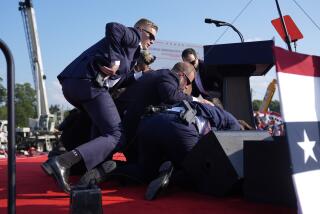Perks Dispute Spreads From Capitol Hill to the White House
- Share via
WASHINGTON — Now it’s the turn of the White House.
While Democratic leaders on Capitol Hill squirmed as public attention focused on congressional perquisites ranging from automobiles to the now-closed House bank, White House officials sat back and enjoyed the discomfort of their partisan rivals.
Now, however, they are also defending the use of door-to-door car service for White House officials, the availability of two work-out rooms, free parking and other perquisites of office.
Chauffeur-driven sedans are available morning, noon and night for six senior officials, including the President’s new domestic policy counselor and his economic adviser, Deputy White House Press Secretary Judy Smith said Monday, because “we think that it’s important, certainly, for them to be in touch with the President” at all times.
The White House comments Monday followed the efforts Sunday of House Speaker Thomas S. Foley (D-Wash.) to turn the tables in the controversy over House perks.
“In fairness, we need to look at the executive branch as well,” he said on the CBS-TV program “Face the Nation.”
President Bush is the No. 1 seed, of sorts, on the White House tennis court, but he is not the only one to use it. It is available on occasion for staff members too.
They eat in the White House mess, run by Navy stewards, and are sent bills each month for their meals. Officials say that prices compare with an inexpensive restaurant. In the evening, if the President or one of his friends is not using it, they can sit in the presidential box at the John F. Kennedy Center for the Performing Arts--taking friends as their guests.
One of the most sought-after perks is what is known as “portal-to-portal” or door-to-door service provided by the White House garage, known by its radio code name of “carpet.”
It is parceled out by the President. Under current protocol, six senior staff members have it: Chief of Staff Samuel K. Skinner; National Security Adviser Brent Scowcroft; Deputy Chief of Staff W. Henson Moore; Deputy National Security Adviser Jonathan Howe; Michael J. Boskin, chairman of the Council of Economic Advisers, and Clayton K. Yeutter, Bush’s new counselor for domestic policy.
Asked why all six need the service, Smith said:
“Well, because I mean it’s been a policy in existence. That is not going to change. . . . There are meetings they need to get to, to and from, working in and outside the White House. . . . This is an option that we have available and that we’ll continue to use.”
More to Read
Get the L.A. Times Politics newsletter
Deeply reported insights into legislation, politics and policy from Sacramento, Washington and beyond. In your inbox twice per week.
You may occasionally receive promotional content from the Los Angeles Times.










